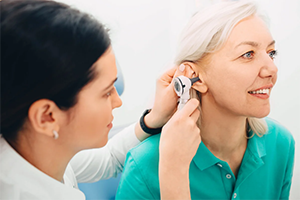
One of the most common misconceptions about hearing loss is that it only affects older adults. In reality, anyone at any age can experience hearing loss or decreased clarity of hearing. Here are six things you should understand about avoiding or minimizing hearing loss at any age:
1. What causes hearing loss?
Hearing loss can be caused by a variety of factors. The most common causes are age-related hearing loss and “noise-induced hearing loss.” Some less common causes are medications, health issues, traumatic injury or genetics.
Age-related hearing loss is the most common cause, affecting one in three adults over the age of 65. Another common cause of hearing loss is noise-induced hearing loss, the only preventable type of hearing loss. It only takes 85 decibels, such as eating in a noisy restaurant, for hearing loss to begin.
2. Who can experience hearing loss?
“Hearing loss can affect people of any age at any time,” says Sarah Maurer, AuD, audiologist with Lovelace Medical Group. “We treat patients as young as six months for hearing issues.”
A genetic condition or an abnormality can cause hearing loss, or can develop due to illness, age or exposure to loud sounds. Individuals in noisy careers, such as factory or construction workers, military personnel and musicians may be more prone to hearing loss than other professions. To prevent this as much as possible, hearing protection is always recommended.
Read how Toni Montoya’s hearing loss made her feel isolated from her grandchildren
3. Can untreated hearing loss cause other issues?
Yes, many health issues such as dementia, cognitive decline and Alzheimer's disease can develop if hearing loss is not addressed. Hearing loss also increases the risk of falls, social isolation, depression, anxiety and cardiac issues. When hearing loss is untreated, pathways in the brain that respond to sound do not get as much stimulation. This causes them to become weaker and not perform as well. People with hearing loss may also begin to withdraw from society and see a quicker decline in cognition.
 4. Who provides treatments for hearing loss?
4. Who provides treatments for hearing loss?
An audiologist, like Sarah Maurer, AuD, is a healthcare professional responsible for the diagnosis, treatment and continued management of hearing and balance disorders. While the diagnosis of hearing loss and treatment with hearing aids are more well-known parts of the audiologist’s practice, audiologists can also diagnose and recommend treatments for hearing disorders, such as tinnitus. They work with patients and surgeons to recommend and program implantable hearing devices like bone-anchored hearing aids (BAHAs) and cochlear implants. Audiologists can diagnose balance disorders and recommend treatments such as the Epley maneuver, a series of head turns that can restore a sense of balance after an inner ear issue.
5. What are treatment options for hearing loss?
After a comprehensive examination, the provider will discuss treatment options. Many times, this will be a hearing device, but it could also include medical treatment. Hearing aids are more commonly used to treat hearing loss, but an implantable device like a Cochlear Implant may be more beneficial, depending on the patient's type and degree of hearing loss.
6. How do you choose the right hearing aid?
When choosing the right hearing device, patients work with Lovelace providers to discuss the various brands, styles, and technology levels of the device. After selecting a hearing aid, the provider will include follow-up care of the device throughout the warranty period. This includes all programming and follow-ups with the audiologist, regular cleanings and maintenance, as well as real ear measurements, an audiological procedure to ensure that a hearing aid is properly fitted and functioning properly.
October is National Protect Your Hearing Month and National Audiology Awareness Month. To schedule an appointment with an audiologist, call (505) 727-1670 or visit our home page.




